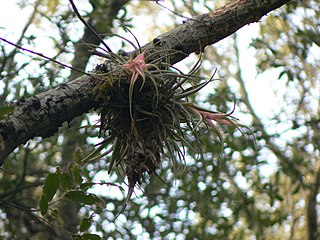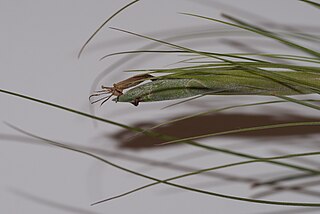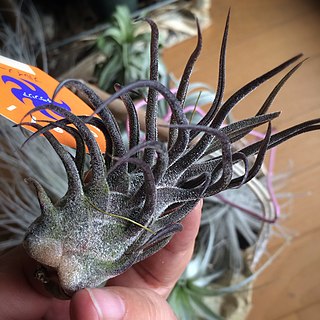Related Research Articles

Tillandsia is a genus of around 650 species of evergreen, perennial flowering plants in the family Bromeliaceae, native to the forests, mountains and deserts of northern Mexico and south-eastern United States, Mesoamerica and the Caribbean to mid Argentina. Their leaves, more or less silvery in color, are covered with specialized cells (trichomes) capable of rapidly absorbing water that gathers on them.

Tillandsia albida is a plant species in the genus Tillandsia. This species is endemic to Mexico.

Tillandsia bourgaei is a species of flowering plant in the Bromeliaceae family. This species is endemic to Mexico.

Tillandsia erubescens is a species of epiphytic plants of the genus Tillandsia. This species is endemic to Mexico, found over much of the country from Chihuahua to Oaxaca.
Tillandsia parryi is a species of flowering plant in the Bromeliaceae family. This species is endemic to Mexico.

Tillandsia juncea is a species in the genus Tillandsia. This species is native to northern South America, Central America, Mexico and the West indies.
Tillandsia polystachia is a species in the genus Tillandsia. This species is native to Central America, the West Indies, Bolivia, Colombia, Brazil, Ecuador, Mexico and Venezuela.

Tillandsia pruinosa, is a species of flowering plant in the Bromeliaceae family. It is commonly known as the fuzzywuzzy airplant. This species is native to northern South America, Central America, southern Mexico, the West Indies and Florida.

Tillandsia fasciculata, commonly known as the giant airplant or cardinal airplant, is a species of bromeliad that is native to Central America, Mexico, the West Indies, northern South America, and the southeastern United States. Within the United States, this airplant is at risk of extirpation from the Mexican bromeliad weevil, Metamasius callizona.

Tillandsia flabellata is a species of flowering plant in the Bromeliaceae family. This species is native to southern Mexico and Central America.
Tillandsia flexuosa, the twisted airplant, is a species of bromeliad in the genus Tillandsia. This species is native to Central America, southeastern Mexico, northern South America and the United States (Florida).

Tillandsia ionantha, the air plant, is a species in the genus Tillandsia. This species is native to Central America and Mexico. It is also reportedly naturalized in Broward County, Florida.
Tillandsia lampropoda is a species in the genus Tillandsia. This species is native to Central America and southern Mexico, from Oaxaca to Panama.
Tillandsia makoyana is a species of flowering plant in the Bromeliaceae family. This species is native to Costa Rica and Mexico.
Tillandsia rhomboidea is a species of flowering plant in the Bromeliaceae family. It is native to Colombia, Bolivia, Honduras, Chiapas, Venezuela, Costa Rica, and Ecuador.

Tillandsia schiedeana is a species in the genus Tillandsia. It was named for the collector Schiede. As an epiphyte it is found "growing in open tropical forests, and saxicolous, growing on cacti and burseras on steep dry slopes in semiarid regions in Mexico, Central America, West Indies, Venezuela, and Colombia at elevations of 750 to 5,500 feet."

Tillandsia seleriana is a species in the genus Tillandsia. This species is native to southern Mexico and Central America.

Tillandsia streptophylla is a species in the genus Tillandsia. This species is native to Central America, Mexico, and the West Indies.

Tillandsia tricolor is a species in the genus Tillandsia. This species is native to Central America and Mexico.

Tillandsia utriculata, commonly known as the spreading airplant or the giant airplant, is a species of bromeliad that is native to Florida and Georgia in the United States, the Caribbean, southern and eastern Mexico, Central America, and Venezuela.
References
- ↑ "Tillandsia dugesii Baker". Plants of the World Online. The Trustees of the Royal Botanic Gardens, Kew. n.d. Retrieved July 18, 2020.
- Espejo-Serna, Adolfo; López-Ferrari, Ana Rosa; Ramírez-morillo, Ivón; Holst, Bruce K.; Luther, Harry E.; Till, Walter (1 June 2004). "Checklist of Mexican Bromeliaceae with Notes on Species Distribution and Levels of Endemism". Selbyana. 25 (1): 33–86. ISSN 2689-0682. JSTOR 41760147.